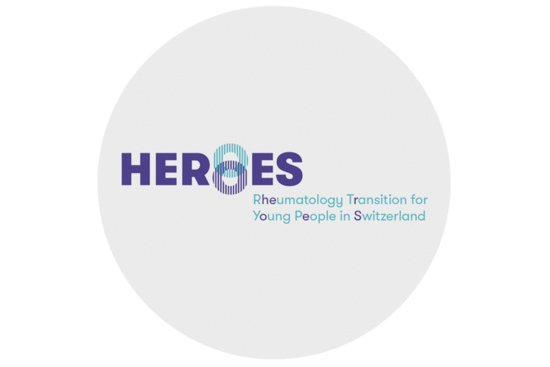
HEROES
Projektname
rHEumatology tRansition for yOung pEople in Switzerland
Projektleitung
Lut Berben
INS-Projektteam
Lut Berben
Externe Projektpartner
Dr. Andreas Wörner, University Children’s Hospital Basel; Cantonal Hospital Aarau; Valais Hospital (Visp)
Mary Louise Daly, University Children’s Hospital Basel; University Hospital Basel
Prof. Dr. Thomas Daikeler, University Hospital Basel
Prof. Dr. Klaus Tenbrock, University Hospital Bern
Dr. Matthias Gasser, University Hospital Bern
Prof. Dr. Sabine Adler, Cantonal Hospital Aarau
Dr. Isabelle Bolt, Berner Rheumazentrum am Viktoriaplatz
Laura Strahm, Berner Rheumazentrum am Viktoriaplatz
Prof. Dr. Johannes Roth, Cantonal Hospital Lucerne
Dr. Daniela Kaiser, Cantonal Hospital Lucerne
Dr. Gernot Schmid, Cantonal Hospital Lucerne
Dr. Katerina Theodoropoulou, Lausanne University Hospital
Dr. Annette von Scheuven, Lausanne University Hospital
Dr. Katerina Koryllou, Lausanne University Hospital; Valais Hospital (Sion); Réseau Hospitalier Neuchâtelois
Dr. Diana Dan, Lausanne University Hospital
Dr. Eva Adank, Cantonal Hospital Graubünden
Dr. Jürg Wick, Cantonal Hospital Graubünden
Dr. Géraldine Blanchard Rohner, University Hosptial of Geneva
Dr. Manel Mejbril, University Hosptial of Geneva
Dr. Federica Vanoni, Regional Hospital Bellinzona
Dr. Natalie Marcoli, Regional Hospital Lugano
Prof. Dr. Christian Huemer, Children’s Hospital of Eastern Switzerland
Dr. Yella Rottländer, Cantonal Hospital St.Gallen
Dr. Seraina Palmer Sarott, University Children’s Hospital Zurich; Cantonal Hospital Winterthur
Dr. Susanne Enderlin Steiger, Rheumaclinic Bethanien, Zurich
Christa Soennichsen, Cantonal Hospital Winterthur
Prof. Lukas Wildi, Cantonal Hospital Winterthur
Adolescents and young adults, parents
Ort der Datenerhebung
Cantonal Hospital Aarau
University Children’s Hospital Basel
University Hospital Basel
University Hospital Bern
Berner Rheumazentrum am Viktoriaplatz
Cantonal Hospital Lucerne
Lausanne University Hospital
Valais Hospital (Visp and Sion)
Réseau Hospitalier Neuchâtelois
Cantonal Hospital Graubünden
University Hosptial of Geneva
Regional Hospital Bellinzona
Regional Hospital Lugano
Children’s Hospital of Eastern Switzerland
Cantonal Hospital St.Gallen
University Children’s Hospital Zurich
Cantonal Hospital Winterthur
Rheumaclinic Bethanien, Zurich
Cantonal Hospital Winterthur
Laufzeit
2023 bis 2026
Projektbeschreibung
Background
Up to 50% of children diagnosed with a rheumatic disease need continuous medical care during adulthood. However, pediatric and adult health care settings significantly differ from each other. In addition to changing health care setting and -team, the adolescent and young adult needs to assume responsibility for managing their illness in daily life, which had been mainly done by parents. These changes take place during adolescence, one of the most difficult phases in life. In addition to the normal challenges of being a teenager, adolescent and young adults suffering from chronic disease(s) have to deal with disease related issues (e.g. physical and/or mental disabilities). An inadequate transition from pediatric to adult care can have serious negative consequences. A well-planned transition built on an individual, structured management plan is crucial for successful transition to adult healthcare. A recent study assessing current transitional care practice in all 10 pediatric Swiss rheumatology clinics and their collaborating adult rheumatology centers, showed large variability between the centers and many recommendations for good transitional care were not implemented.
Aim
The overall objective of this study is to develop, implement and evaluate a transitional care program for adolescents and young adults with a rheumatic disease moving from pediatric to adult settings in Switzerland.
Specific aims are:
- To explore the current everyday transitional care practices
- To understand the experiences and unmet needs related to current transitional care practices of adolescents, young adults, and parents
- To understand healthcare professionals’ experiences and unmet needs for current transitional care in their center
- To analyze stakeholders’ barriers and facilitators to implementing a transitional care program
- To develop and implement a transitional care program
- To evaluate the effectiveness of the transitional care program in relation to disease-related outcomes
- To evaluate adolescents and young adults, parents & healthcare professional-reported outcomes and care experiences in relation to the transitional care program
- To evaluate the implementation outcomes of the transitional care program in relation to adoption, implementation, and sustainability
- To evaluate the economic outcomes of the transitional care program
Methods
To ensure a successful development, implementation and sustainability of the transitional care program, this study is based on the principle of implementation science. Overall, a hybrid-effectiveness implementation type 2 design is being used. A participatory partnership approach is used.
The following implementation outcomes will be assessed by interviews and questionnaires: acceptability, feasibility, appropriateness of the intervention, adoption, fidelity/penetration, and sustainability. Effectiveness outcomes will be assessed at the adolescent and young adult, the parent, the health care professionals, and healthcare setting/system levels and include quality-of-life, treatment and appointment adherence, trust in the healthcare team, satisfaction with transitional care, and work satisfaction. Economic outcomes will be measured at the adolescents and young adults, parents, and healthcare setting/system level and will include unplanned healthcare provider visits and absences from work.
Conclusion
The HEROES-study will enhance the successful development and long-term implementation of a transitional care program for adolescents and young adults with a rheumatic disease moving from pediatric to adult settings in Switzerland. Although the HEROES-study focuses on rheumatology, the methods used as well as the results generated can be adopted for other chronic illnesses.
